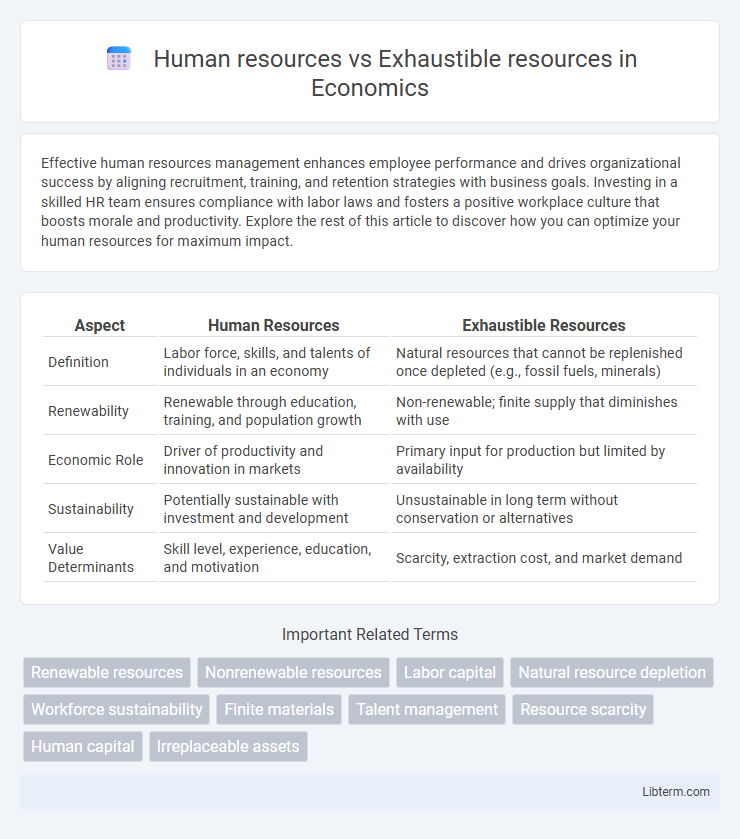Effective human resources management enhances employee performance and drives organizational success by aligning recruitment, training, and retention strategies with business goals. Investing in a skilled HR team ensures compliance with labor laws and fosters a positive workplace culture that boosts morale and productivity. Explore the rest of this article to discover how you can optimize your human resources for maximum impact.
Table of Comparison
| Aspect | Human Resources | Exhaustible Resources |
|---|---|---|
| Definition | Labor force, skills, and talents of individuals in an economy | Natural resources that cannot be replenished once depleted (e.g., fossil fuels, minerals) |
| Renewability | Renewable through education, training, and population growth | Non-renewable; finite supply that diminishes with use |
| Economic Role | Driver of productivity and innovation in markets | Primary input for production but limited by availability |
| Sustainability | Potentially sustainable with investment and development | Unsustainable in long term without conservation or alternatives |
| Value Determinants | Skill level, experience, education, and motivation | Scarcity, extraction cost, and market demand |
Understanding Human Resources: Definition and Scope
Human resources encompass the skills, knowledge, and abilities possessed by individuals essential for organizational success, representing a dynamic and renewable asset. Unlike exhaustible resources such as minerals or fossil fuels, human resources continuously evolve through education, training, and experience, expanding their value and applicability. The scope of human resources includes workforce planning, development, and management aimed at maximizing productivity and fostering sustainable growth within organizations.
What Are Exhaustible Resources? An Overview
Exhaustible resources are natural materials that cannot be replenished within a human timeframe, such as fossil fuels, minerals, and certain groundwater sources, distinguishing them from human resources focused on workforce skills and capabilities. These non-renewable resources face depletion risks due to extraction rates exceeding natural regeneration, impacting sustainability and economic development. Understanding exhaustible resources involves analyzing their finite availability, extraction impacts, and the necessity for efficient management and alternative energy solutions.
Key Differences: Human vs. Exhaustible Resources
Human resources refer to the workforce's skills, knowledge, and abilities that drive productivity and innovation, whereas exhaustible resources are finite natural materials like minerals, fossil fuels, and metals subject to depletion through extraction. Human resources can regenerate and expand through education and training, while exhaustible resources diminish with use and cannot be replenished on a human timescale. The key difference lies in sustainability: human resources offer renewable potential for economic growth, whereas exhaustible resources impose limits on long-term availability and environmental impact.
The Role of Human Resources in Economic Development
Human resources are a critical driver of economic development, providing the knowledge, skills, and innovation necessary to increase productivity and foster sustainable growth. Unlike exhaustible resources such as fossil fuels and minerals, which deplete over time, human resources can be continuously developed and enhanced through education, training, and health improvements. Investment in human capital leads to technological advancements, improved labor quality, and higher economic output, distinguishing it as a vital component in long-term economic progress.
Limitations of Exhaustible Resources in Modern Industry
Exhaustible resources such as fossil fuels, minerals, and metals face significant limitations in modern industry due to their finite supply and declining availability. The depletion of these resources drives up extraction costs and environmental degradation, impacting sustainable industrial growth. Human resources, in contrast, provide a renewable and adaptable workforce essential for innovation and technological advancement, helping industries transition towards more sustainable practices.
Sustainability: Human Resources and Resource Management
Human resources represent renewable assets essential for sustainable development, as their skills and knowledge can be continuously enhanced through education and training. Exhaustible resources, such as fossil fuels and minerals, have finite quantities that necessitate careful management to prevent depletion and environmental degradation. Sustainable resource management prioritizes optimizing human capital while implementing efficient use and conservation strategies for exhaustible resources to balance economic growth and ecological preservation.
Impact of Technology on Human and Exhaustible Resources
Technological advancements significantly enhance the efficiency and productivity of human resources by automating repetitive tasks and enabling skill development through digital platforms. In contrast, technology impacts exhaustible resources by improving extraction methods and resource management, yet it also accelerates depletion rates due to increased consumption and industrial expansion. Sustainable innovations such as renewable energy technologies and smart resource monitoring systems aim to mitigate negative effects on non-renewable materials and support long-term ecological balance.
Strategies for Conserving Exhaustible Resources
Effective strategies for conserving exhaustible resources include implementing sustainable extraction methods, promoting recycling and reuse, and investing in alternative technologies to reduce dependency on finite materials. Governments and industries prioritize regulatory policies, such as quotas and taxes, to limit resource depletion and incentivize resource efficiency. Public awareness campaigns and research on resource substitution are crucial to preserving exhaustible resources while supporting long-term economic growth.
Enhancing Human Resource Potential for Future Growth
Enhancing human resource potential involves investing in education, skills development, and health to create a resilient workforce capable of driving sustainable economic growth. Unlike exhaustible resources such as fossil fuels or minerals that diminish with use, human resources can be continuously renewed and expanded through training and innovation. Prioritizing human capital development ensures long-term competitiveness and adaptability in rapidly changing global markets.
Human Resources vs Exhaustible Resources: A Comparative Analysis
Human resources represent the intangible assets of skills, knowledge, and labor power that drive economic growth and innovation, whereas exhaustible resources are finite natural materials like fossil fuels and minerals that deplete over time with extraction. The sustainability of human resources lies in education, health, and workforce development, enabling continuous regeneration and productivity, contrasting sharply with the irreversible consumption and scarcity challenges of exhaustible resources. Effective management of these resources requires investing in human capital to foster renewable economic inputs while implementing conservation and technological advancements to optimize the use of exhaustible resources.
Human resources Infographic

 libterm.com
libterm.com